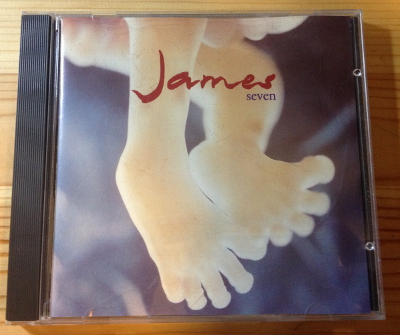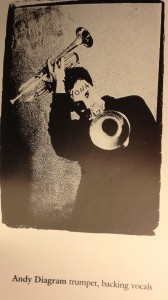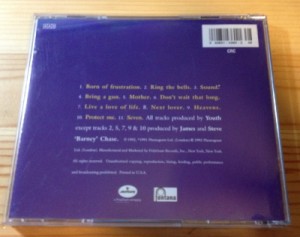 For Christmas in 1992, I received two gifts that would change my life. The first was The Legend of Zelda: A Link to the Past for SNES that, for better or worse, would consume my free time for at least a year. The second, was a CD boombox, which, even though I had no CDs at the time, would became one of my most prized possessions. As I recall, I had access to John Lennon’s greatest hits, a few Christmas CDs, and some assorted classical music. Cassettes were still the dominant form of listening material in my household.
For Christmas in 1992, I received two gifts that would change my life. The first was The Legend of Zelda: A Link to the Past for SNES that, for better or worse, would consume my free time for at least a year. The second, was a CD boombox, which, even though I had no CDs at the time, would became one of my most prized possessions. As I recall, I had access to John Lennon’s greatest hits, a few Christmas CDs, and some assorted classical music. Cassettes were still the dominant form of listening material in my household.
That changed when my brother Brad would come home from college for summer break. He brought with him his fancy, extremely expensive stereo system and his collection of CDs, which numbered in the hundreds. It seems quaint now, but that CD library was extremely important to me. We only barely got radio reception from Chicago where I grew up, and what stations we did get were very limiting. In addition, digital receivers were in rare supply, so one had to manipulate a very small dial to tune in a station; at the fringes of broadcast range, that task required the feather touch of a brain surgeon.
To expand my own meager music offerings, I began by recording songs onto cassette from the radio. However, DJs had the annoying tendency to talk over opening instrumentals, so most tracks on these tapes were littered with the detritus that is on-air chatter. Worse yet, cassettes were clunky and time consuming to dupicate (duplicating a cassette took as long as the recording time, 90 minutes [for both sides] in most cases) and stringing together tracks required precision on the FF and REW buttons, something most consumer tape decks were not designed for.
The CD boombox gave me a way to combat this. Any time I had a CD from any source for a day or so, I could record that CD onto a (relatively) cheap cassette tape. These tapes could be taken with me and played on my Walkman, whether it was a trip to Chicago or mowing the lawn. On a side note, those tapes looked pretty good (despite the poor audio quality) during skip-ravaged Discman years of my late teens.
It was on a taped CD that I first experienced Seven by a relatively unknown band in the U.S., James. It was in my brother’s collection, and I probably first heard it near the summer of 1993.
The sound is something very different from the grungy, harder rock I was listening to at the time. Whereas a lot of my friends were trending toward the metal bands like Metallica, funkier sounds like Red Hot Chili Peppers, or punk sounds from bands like NOFX and Rancid, I made room for more pop- and folk-sounding bands in my listening repertoire. James had their roots in folk rock in the 1980s, but Seven has a lot more emphasis on big-sounding, instrumental crescendos. To me it is one of the definitive sounds of the 90s, with the jangling acoustic guitar and horns as a symbol of the hippie, return-to-nature vibe of the 90s that followed the artificiality of the 80s.
 There’s no shortage of emotion from vocalist Tim Booth, who really holds nothing back (including his falsetto) on this album, especially the opening track “Born of Frustration.” It has an opening guitar lick that is probably memorable to a lot of people – the song was a minor radio hit and was used in several commercials – before Booth breaks in with his falsetto followed by the blazing trumpet of Andy Diagram. Clearly the producer, band mates, or some combination of both recognized Diagram was on a tear during the recording, because he is featured on fully every track and gives the band that signature sound. “Sound” (funny enough) encapsulates all of the album’s major elements: Booth’s subtle vocals that quietly erupt in the chorus, his well delivered falsetto, and the brazenness of Diagram’s trumpet (thought it is a bit subdued in this song). Both band members have their opportunity to shine, and it’s not difficult to imagine why Diagram would later leave the band as his talent and contribution is equal to Booth’s on this album.
There’s no shortage of emotion from vocalist Tim Booth, who really holds nothing back (including his falsetto) on this album, especially the opening track “Born of Frustration.” It has an opening guitar lick that is probably memorable to a lot of people – the song was a minor radio hit and was used in several commercials – before Booth breaks in with his falsetto followed by the blazing trumpet of Andy Diagram. Clearly the producer, band mates, or some combination of both recognized Diagram was on a tear during the recording, because he is featured on fully every track and gives the band that signature sound. “Sound” (funny enough) encapsulates all of the album’s major elements: Booth’s subtle vocals that quietly erupt in the chorus, his well delivered falsetto, and the brazenness of Diagram’s trumpet (thought it is a bit subdued in this song). Both band members have their opportunity to shine, and it’s not difficult to imagine why Diagram would later leave the band as his talent and contribution is equal to Booth’s on this album.
“Mother” is some kind of unspecified war ballad, opening with the somewhat unconvincing line “This war’s a motherfucker, how many sons will we kill today?” I’m guessing this might be related to the clashes between the IRA and British army in Northern Ireland, but it’s unspecified vagaries combined with its ponderous tone make it laughable when compared with more substantial war ballads (e.g. U2 “New Year’s Day”) or songs that don’t take themselves so seriously (e.g. New Order “Love Vigilantes”).
Luckily, the band doesn’t dwell on such temporal subject matter; the content is much more intimate and driven by the space in the hearts, bedrooms, homes, and worlds of personal relationships. Whereas “Born of Frustration” targets the burgeoning sexuality of adolescence (or some kind of frustrated love) and serves as a genesis of the album – and maybe hearkens to the genesis of life given the image of the fetus on the album cover – the scope of the middle of the album narrows considerably to the frustrations of a relationship. “Don’t Wait that Long” adopts the slow jam beat of R&B, with the whispered lyrics of Booth and breathy, backing vocals sending out a sexy vibe. Booth’s falsetto vocals are still masculine, but with a touch of the feminine as well, presenting an androgynous vibe that works well in intimate tracks like this. The dreamy sound of Diagram’s trumpet in the background almost mimics a saxophone, and my (somewhat cliche) mind’s eye puts him on a street corner with steam rising from the subway grates. I’m not familiar with Manchester, but a hot night in the city is surely captured sonically in this track.
“Next Lover” is somewhat a product of the band’s “jam” writing style and has a rambling, raga feel that seems out of place on an album as polished as this (as does the somewhat overactive “Bring a Gun”). It is followed by the divine opening piano and guitar of “Heavens.” The track itself is relatively straightforward and a solid entry in the album, but the opening is just wonderful. “Protect Me” is a desperate, waltz-like ballad that functions as a plea, and in some ways a regresses the narrator to the feet of his lover(/angel/god?) to shield him from the horrors of the outside world.
Perhaps the most fascinating track is the concluding, pseudo-suite “Seven” that is both mysteriously titled and simultaneously dispels and reinforces the centrality of love that the album embodies. Much like the grandiosity of the opening track, the narrator of this track professes “God made love to me” and repeatedly rejoins, “understand the world we’re living in, love can mean anything,” before finally admitting at the end of the song that “love can change anything.” It would come across as a callous, masculine blow off, except that the man is rejecting the love protestation of the woman. It’s open to critical debate, but that’s the way I read it. The guitars on the track are as crisp as they come, but there are some ambient sounds interlaced in the latter part of the track; although they are relatively rudimentary, they portend the ambient sounds James would explore with Brian Eno to good effect in later albums.
Overall, I have very little bad to say about this album, and, while clearly embodying the spirit and sound of the time, it holds up relatively well on a relisten. It was one of my first introductions to an album that was solid from start to finish with little filler material. It also, in combination with the next entry in this series, opened the door to a world of contemporary music for me that was neither grunge, metal, or punk, the major musical tribes sweeping across the landscape of my youth.
OK, gotcha, next please:
Phish: (Hoist) [apparently it has parentheses in the title] (8.21)
Sting: Ten Summoner’s Tales (8.28)
Green Day: Dookie (9.4)
Nirvana: MTV Unplugged (9.11)